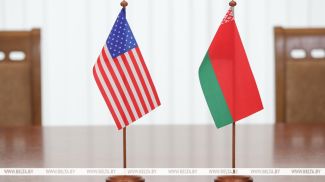The CIS leaders discussed in detail the development of the epidemiological situation and proposals for additional measures to combat the COVID-19 pandemic. Head of the Russian Federal Service for Surveillance on Consumer Rights Protection and Human Wellbeing – Chief State Sanitary Physician Anna Popova was invited to the summit to speak on the issue. The CIS leaders responded to her speech by voicing their vision of the situation and asking the expert their questions.
Aleksandr Lukashenko, in turn, noted that it is important for the heads of state to understand how the pandemic situation will develop in the future. “The main question for us is the forecast,” the Belarusian leader said.
Aleksandr Lukashenko pointed out that from the very first months of the pandemic he asked experts to provide a forecast both for a specific variant of the coronavirus and, possibly, for the future development of the situation, too. Belarus reached out to Russian specialists in this regard as well. However, none of the forecasts have met predictions in full. “Maybe you can tell us how things will development tomorrow, what we should guide by?” the president asked.
Anna Popova said that it is difficult to predict how the situation would develop in the future. “No one in the world has a definite answer as to what will happen tomorrow. However, it is absolutely clear that if we do not vaccinate people and take the sanitary measures that we are taking today, it will be much worse tomorrow. Whatever variant comes next, it will be a variant of the same strain, so the vaccine will work,” she emphasized.
“I talked to the head of the Gamaleya Center. They did a study: the Sputnik V will definitely neutralize the new Omicron variant. He told me that only the clinical findings can give a definitive answer to this question, but the level of neutralization is very high,” Russian President Vladimir Putin said.
Aleksandr Lukashenko asked the chief sanitary doctor of Russia whether there would be new variants of the coronavirus after Omicron.
“No virus stops in its development and Omicron is very much unlikely to be the final one. We cannot say which one will be next, but any virus lives only when it changes,” Anna Popova explained.
“Is Omicron variant milder than the other COVID-19 variants?” the Belarusian head of state asked.
According to the chief sanitary doctor, Russian specialists went to South Africa to study the Omicron variant. It turned out that in that country the virus does not cause a severe course of the disease, except for those who have not been vaccinated or who have some chronic diseases. However, Anna Popova said that this may be because the average age of South Africans is under 30 years old and the majority of young people do not develop severe symptoms with the COVID-19.
According to her, the situation with Omicron in the UK is not quite illustrative either: the general level of immunization exceeds 80% there.
"No other serious epidemiological observations have yet been published. We have been following this very closely. But it [omicron] is much more contagious, and more people get infected immediately. This is very important. Because when the virus is that active it means more people from the high-risk group are likely to be affected. This can overstretch the healthcare system,” said Anna Popova.
For the time being experts cannot say that the pandemic is declining, and are preparing to counteract the spread of a new variant, to continue to protect people, Anna Popova noted.
The CIS leaders continued the discussion of the epidemiological situation in the CIS and other topics related to the integration behind closed doors.













